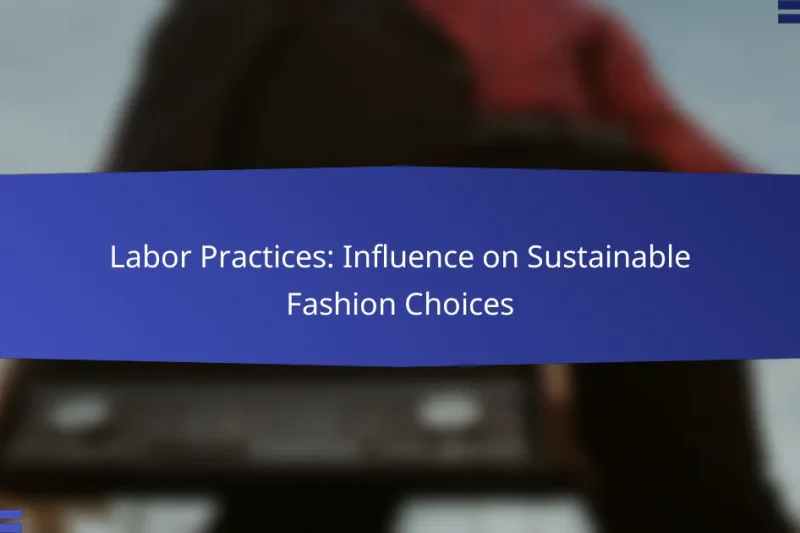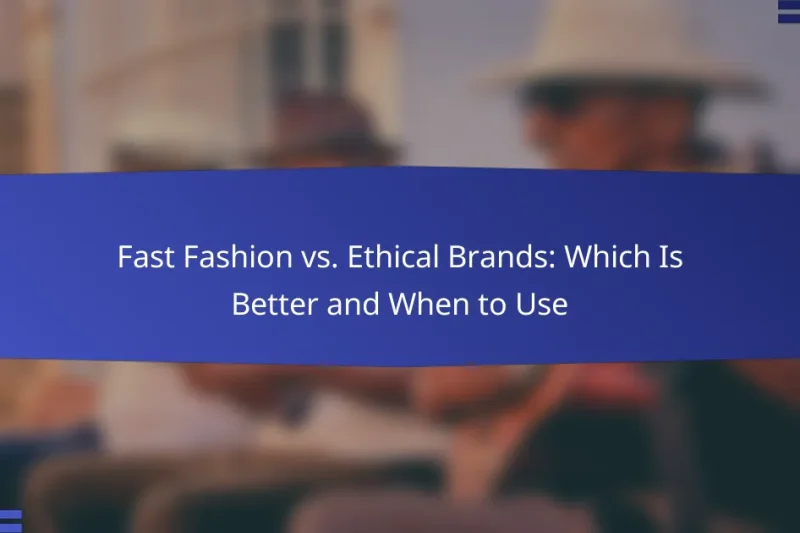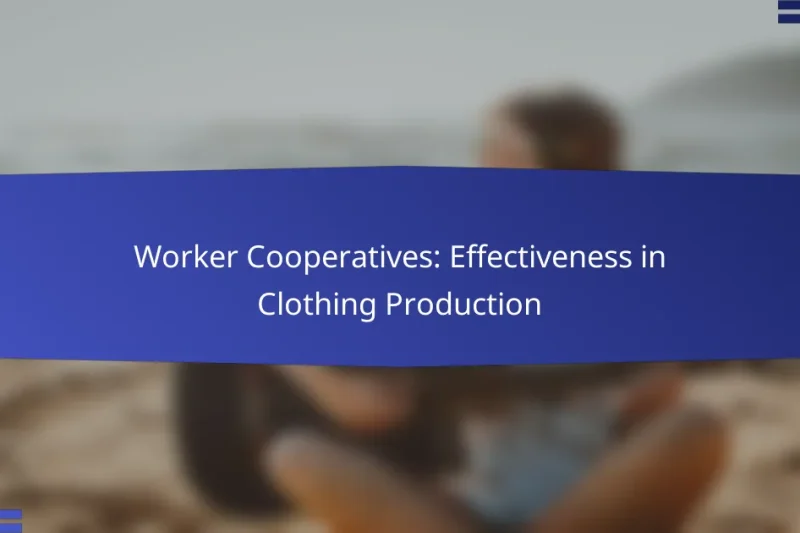Fair Trade Certification ensures that products are ethically sourced, promoting sustainable practices and supporting communities in … Fair Trade Certification: Meaning, Benefits and Consumer ImpactRead more
Ethical Production in Fashion
Ethical production in fashion emphasizes sustainability and fair labor practices, encouraging consumers to make informed choices that support responsible brands. By prioritizing ethical standards, opting for second-hand items, and participating in community initiatives, individuals can contribute to a more sustainable industry. This approach not only reduces environmental impact but also fosters improved labor conditions and brand loyalty among consumers who value ethical practices.
Ethical Fashion: Key Practices to Look for in Brands
Ethical fashion emphasizes sustainable practices and social responsibility, focusing on the use of eco-friendly materials and … Ethical Fashion: Key Practices to Look for in BrandsRead more
Transparency: Role in Fashion Supply Chains
Transparency plays a crucial role in fashion supply chains by promoting accountability and empowering consumers to … Transparency: Role in Fashion Supply ChainsRead more
Ethical Manufacturing: Identifying Committed Brands
Identifying ethical manufacturing brands in the USA requires a close examination of their practices, certifications, and … Ethical Manufacturing: Identifying Committed BrandsRead more
Labor Practices: Influence on Sustainable Fashion Choices
Labor practices play a crucial role in shaping sustainable fashion choices, as they directly impact consumer … Labor Practices: Influence on Sustainable Fashion ChoicesRead more
Fast Fashion vs. Ethical Brands: Which Is Better and When to Use
In the ongoing debate between fast fashion and ethical brands, consumers face a choice that balances … Fast Fashion vs. Ethical Brands: Which Is Better and When to UseRead more
Worker Cooperatives: Effectiveness in Clothing Production
Worker cooperatives are transforming clothing production by creating a collaborative environment where employees actively participate in … Worker Cooperatives: Effectiveness in Clothing ProductionRead more
How can consumers support ethical fashion production?
Consumers can support ethical fashion production by making informed choices that prioritize sustainability and fair labor practices. This involves selecting brands that adhere to ethical standards, opting for second-hand items, and engaging in community initiatives like clothing swaps.
Purchasing from sustainable brands
Buying from sustainable brands is a direct way to support ethical fashion. These brands typically use eco-friendly materials, implement fair labor practices, and maintain transparency in their supply chains. Look for certifications such as Fair Trade or GOTS (Global Organic Textile Standard) to ensure the brand meets ethical criteria.
When shopping, consider the longevity of the items. Investing in higher-quality pieces may cost more upfront but can save money over time as they last longer than fast fashion alternatives. Aim for brands that offer a clear commitment to sustainability and ethical production.
Choosing second-hand clothing
Second-hand clothing is an excellent option for supporting ethical fashion while reducing waste. Thrift stores, consignment shops, and online platforms offer a wide range of pre-owned garments, often at lower prices than new items. This practice not only extends the life of clothing but also minimizes the demand for new production.
When selecting second-hand items, check for quality and durability. Look for well-made pieces from reputable brands, as these are likely to last longer. Additionally, consider the environmental impact of your choices; buying second-hand significantly reduces your carbon footprint compared to purchasing new clothing.
Participating in clothing swaps
Clothing swaps are community events where individuals exchange garments they no longer wear. This practice fosters a sense of community while promoting sustainable fashion choices. By participating in swaps, you can refresh your wardrobe without spending money or contributing to waste.
To organize or join a clothing swap, gather a group of friends or community members. Set guidelines for acceptable items and ensure everyone brings clean, gently used clothing. This not only provides a fun social experience but also encourages mindful consumption and sharing within your community.
What are the benefits of ethical production in fashion?
Ethical production in fashion offers numerous benefits, including a reduced environmental impact, improved labor conditions, and enhanced brand loyalty. These advantages not only contribute to a more sustainable industry but also resonate with consumers who prioritize ethical practices.
Reduced environmental impact
Ethical production significantly lowers the environmental footprint of fashion. This includes using sustainable materials, minimizing waste, and reducing carbon emissions during manufacturing. Brands often adopt practices like recycling fabrics and utilizing eco-friendly dyes to lessen their ecological impact.
For example, many companies are shifting towards organic cotton or recycled polyester, which require less water and energy compared to conventional materials. By implementing these practices, brands can appeal to environmentally conscious consumers and contribute to a healthier planet.
Improved labor conditions
Ethical production ensures fair labor practices, providing workers with safe environments, fair wages, and reasonable working hours. This approach helps combat exploitation and supports the rights of garment workers, particularly in developing countries where labor laws may be lax.
Brands committed to ethical production often undergo third-party audits to verify compliance with labor standards. This transparency builds trust with consumers who are increasingly concerned about the origins of their clothing and the conditions under which they were made.
Enhanced brand loyalty
Consumers are more likely to support brands that demonstrate a commitment to ethical production. By aligning with values such as sustainability and social responsibility, brands can foster a loyal customer base that appreciates their efforts. This loyalty can translate into repeat purchases and positive word-of-mouth marketing.
To cultivate brand loyalty, companies should communicate their ethical practices clearly through marketing and product labeling. Engaging storytelling about the brand’s journey towards ethical production can further strengthen the emotional connection with consumers, encouraging them to choose these brands over competitors.
Which brands are leading in ethical fashion production?
Several brands are recognized for their commitment to ethical fashion production, focusing on sustainable practices, fair labor conditions, and environmentally friendly materials. Leading names include Patagonia, Eileen Fisher, and Reformation, each with unique approaches to promoting ethical standards in the fashion industry.
Patagonia
Patagonia is renowned for its dedication to environmental sustainability and ethical labor practices. The brand uses organic cotton, recycled materials, and promotes fair trade practices in its supply chain.
One of Patagonia’s key initiatives is the “Worn Wear” program, which encourages customers to repair and reuse their clothing instead of discarding it. This approach not only reduces waste but also fosters a culture of sustainability among consumers.
Eileen Fisher
Eileen Fisher emphasizes transparency and sustainability in its production processes. The brand focuses on using organic and renewable fibers and has implemented a comprehensive take-back program to recycle old garments.
Additionally, Eileen Fisher is committed to fair labor practices, ensuring that workers in its supply chain are treated ethically. The brand’s “Vision2020” initiative aims to achieve 100% sustainability by the year 2020, showcasing its long-term commitment to ethical fashion.
Reformation
Reformation is known for its trendy designs that prioritize sustainability. The brand uses eco-friendly materials and practices, such as water-saving techniques and carbon offsetting, to minimize its environmental impact.
Reformation also maintains transparency about its production processes, providing customers with information on the environmental footprint of each item. This level of transparency helps consumers make informed choices about their fashion purchases.
What certifications indicate ethical fashion practices?
Certifications play a crucial role in identifying ethical fashion practices. They provide assurance that brands adhere to specific standards regarding labor rights, environmental impact, and product safety.
Fair Trade Certified
Fair Trade Certified products ensure that workers receive fair wages and work in safe conditions. This certification promotes sustainable farming practices and supports community development, making it a key indicator of ethical production.
Brands that carry this certification often pay a premium for their materials, which directly benefits the producers. Look for the Fair Trade logo on clothing labels to confirm compliance.
Global Organic Textile Standard (GOTS)
The Global Organic Textile Standard (GOTS) is a leading certification for organic fibers, ensuring that textiles are made from at least 70% organic materials. It also mandates environmentally and socially responsible manufacturing processes.
GOTS-certified products must meet strict criteria throughout the supply chain, including ecological and toxicological requirements. This certification is a strong indicator of a brand’s commitment to sustainability and ethical practices.
OEKO-TEX Standard 100
OEKO-TEX Standard 100 certifies that textiles are free from harmful substances, ensuring consumer safety. This certification applies to all stages of production, from raw materials to finished products.
Brands that display the OEKO-TEX label guarantee that their products have been tested for harmful chemicals and are safe for human use. This is particularly important for items like clothing and home textiles that come into direct contact with the skin.
How does ethical production impact pricing?
Ethical production significantly influences pricing by increasing costs associated with sustainable practices and fair labor. Brands committed to ethical standards often face higher expenses, which can lead to elevated retail prices for consumers.
Higher production costs
Ethical production typically incurs higher costs due to several factors, including fair wages for workers, sustainable materials, and environmentally friendly processes. For instance, organic cotton may cost more than conventional cotton, and ensuring safe working conditions can add to labor expenses. These increased costs are often reflected in the final price of the garments.
Brands may also invest in certifications and audits to verify their ethical claims, which further raises production costs. As a result, consumers might see prices that are 20-50% higher than those of fast fashion alternatives.
Value perception among consumers
Consumers increasingly value ethical production, which can justify higher prices. Many shoppers are willing to pay a premium for products that align with their values, such as sustainability and social responsibility. This shift in consumer behavior means that brands can maintain profitability even with elevated pricing.
However, brands must effectively communicate their ethical practices to enhance perceived value. Clear messaging about sourcing, labor conditions, and environmental impact can help consumers understand the rationale behind the pricing, making them more likely to invest in ethical fashion.






